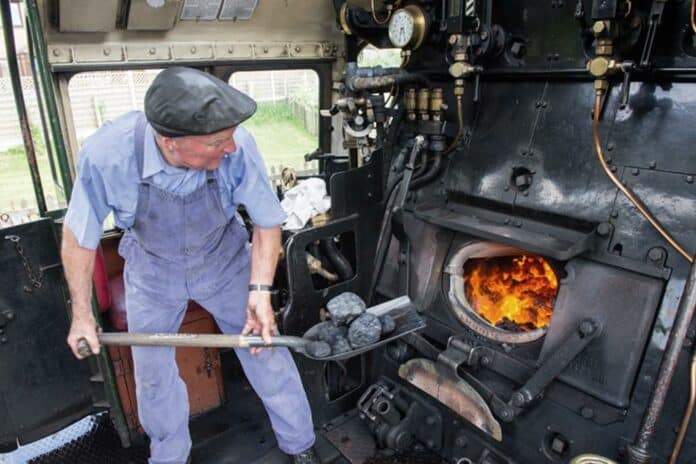An application to open a new coal mine in Northumberland has been rejected by the Government. Tuesday evening’s announcement by Robert Jenrick, Secretary of State for Housing, Communities and Local Government concludes a planning battle begun almost five years ago. The decision has been described as a blow to Britain’s heritage railways, many of which may be forced to reduce or even cease operation as a result.
Heritage railways – as well as traction engines, steam boats and ships, and historic static steam engines – all need coal to function. The kind of coal they need is different to that used by industry or power stations, but can be sourced from the same mines. England’s last mine producing washed bituminous lump coal – vital for heritage steam – ceased extraction last month (August). That spelled the end of washed steam railway coal from coal mining in England, and a bleak future for heritage railways. The planning application which has just been refused was for a new open cast mine at Highthorn, Northumberland. Promising 3m tonnes of coal over several years, the mine would have assured continuity of a coal supply for heritage steam.
On behalf of its members, the Heritage Railway Association has been lobbying government for clarity on the future of coal for heritage steam. The government has been encouraging, stating it has no wish to see the end of heritage steam in the UK. But while it has clearly understood the huge problem facing a key player in the UK’s leisure, tourism and heritage sector, it has yet to offer a solution.
Steve Oates, the Heritage Railway Association’s Chief Executive Officer, says the decision “makes no sense”. He said: “The UK needs five million tonnes of coal every year, for steel and cement production. The decision to end coal production in the UK is driven by CO2 reduction targets. But the CO2 generated by importing coal from countries like Russia and the USA produces ten times more emissions than producing it domestically.”
While importing coal may be a practical, if not environmentally-friendly, solution for the nation’s coal and steel industries, the solution presents huge challenges for heritage railways according to Mr Oates.
He said: “Steam engines need washed lump coal. It’s different to the more finely-grained coal the steel and cement industries need. Britain’s heritage railways use just 26,000 tonnes of coal a year. Such coal can be imported, but it will come at prices most railways simply won’t be able to afford.”
UK-produced coal for famous and much-loved railways like the Bluebell Railway, the Dart Valley, the Ffestiniog, the North Yorkshire Moors Railway, came by a relatively short road trip. No UK heritage railway was more than 400 miles from a dependable source of the right kind of coal. Most had coal available within 200 miles. With imported coal, those distances multiply: 5,000 miles from Russia, 4,700 miles from America, 13,500 miles from Australia.
The heritage rail sector is mindful of the environmental impact of its work. “But UK heritage railways produce just 0.02% of the UK‘s CO2 emissions,” Mr Oates explains. “And for that very small amount, they not only preserve and promote the great enabler of Britain’s proud industrial and social heritage, they provide work for some 4000 people, attract some 13 million visitors annually, and bring an estimated £400 million to the British economy every year.” Even so, he points out, “we still take our environmental responsibilities very seriously, and work at best practice as well as offset schemes, to mitigate the impact of the very small amount of CO2 we produce.”
2020 will have been a brutal year for all of Britain’s heritage railways. The COVID-19 pandemic forced them all to close for what would have been their best months of the year. Many are run on a shoestring – but with a full load of commercial overheads like any other business. Some may not survive the stoppage, while those that have reopened in the last few weeks are emerging financially bruised and bloodied.
How many will be able to swallow a big increase in the price of coal is unknown. “The Highthorn refusal is massively disappointing,” Oates said. “The Heritage Railway Association is considering how to proceed. We’re already taking the lead in evaluating options for securing supplies from overseas, and ways of combining the buying power of our sector to make it happen. In their day, the railways enabled so much of Britain’s proudest history. Today they entertain and educate millions of people every year. We can’t allow them to suffer the unintended consequences of policy decisions.”
Photo credit: Heritage Railway Association
For today’s rail news from railbusinessdaily.com click here.



































 0113 2082620
0113 2082620 info@railbusinessdaily.com
info@railbusinessdaily.com 15 Mariner Court, Wakefield WF4 3FL
15 Mariner Court, Wakefield WF4 3FL

